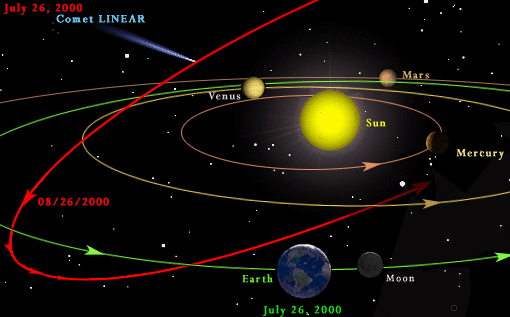
PART 2 PART 1
How fast are comets traveling?
As a comet nears perihelion, it may be traveling at thousands of kilometers a minute, but we see it move slowly against the background of the night time stars, over several weeks or months. Why? Even when comets are visible from Earth, they are often still farther away than the Sun. More distant objects seem to move more slowly, so comets move across the sky slowly compared to the Sun, but more quickly than the stars, which are many times farther off. By the way, the earth itself travels through space at 9.8 kilometers a second as it revolves around the Sun--that's about 22,050 miles per hour!
And look out: the giant planets can have an interesting effect on comets. If a comet happens to pass close by Jupiter, Saturn, Uranus or Neptune, it can actually be punted out of the solar system forever, almost like a bouncing volley ball!
Comet News
In Comet Origins, we mentioned a new comet, Comet Linear. This illustration shows Comet Linear's path through the Solar System.

Note: The planets are shown much bigger than they would be if the Sun was the size in the picture. The Sun is actually over 100 times wider than the earth! The diagram is from the NASA Science News Web site.
The comet passed 56 million (56,000,000) km from Earth on July 22nd and 114 million km from the Sun on July 26, 2000. It appeared to be a first-time visitor to the inner solar system. However, the comet self-destructed near the Sun, revealing its insides to curious scientists. The pieces will continue to orbit the Sun, along the comet's original path.Keep your ears open for news about other comets. You can try contacting a local science museum or astronomy club, or check out some other Web sites about comets.
This concludes our section on comet orbits. Click Continue to find out: what's the difference between a comet and...?
![]()
©Copyright 2000 Regents of the University of California.